Single Spotlight: Spike, Tournament Grinder

This weekend sees the launch of Unstable, the third in a trilogy of Magic comedy sets, following Unglued and Unhinged. While this set has been designed to draft (and I’m sure I’ll get roped into one or two), I’m most definitely not the target market. One card, however has caught my interest – to explain why, let me tell you a bit about myself.
I like Magic flavour. The feeling of casting a Harnessed Lightning and having it zap a creature off the board is pretty succinct – if you’ve ever seen me play, you may even notice I occasionally remark ‘BZZZT’ when zapping an opponent’s dude.
I like Magic aesthetics. Every deck I play has matching full-art basics, preferably with artwork to fit the colour-pair and theme of the deck e.g. UB Control opts for the darkest and grimiest lands. Every deck I’ve played and even loaned out has come fully equipped with the proper tokens. Sleeved tokens.
I like casual Magic. Brewing up terrible decks (I’m looking at you, Bounty of the Luxa) and jamming them at home or at the LGS on a random weeknight is great fun. I like cracking packs and doing a pick 1 pack 1 discussion with friends at the local bar, partly to learn, but mostly just to start a conversation and watch as it effortlessly cascades into nonsense.
I like all of these things to varying degrees. Do you know what I love, however? Competition.
I am in my element in a tournament. The most enjoyment I get out of this game is in identifying the correct line, navigating myself out of a seemingly-impossible scenario, and claiming an unlikely victory. The higher the stakes, the more I love it, whether that’s at an FNM or in a PPTQ final. I thrive on playing tough competition, getting stomped, and learning what I could have done differently. I constantly shoot for the top prize, but the prize isn’t the goal – the goal is simply the win itself, and I enjoy every well-executed turn, every clever bluff and every crushing defeat on the way.
I am not interested in casting fifteen mana spells or drawing fifty cards at once. I am not Timmy, Power Gamer.
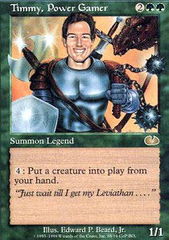
I don’t seek out the best four-card combos available to me, whether they can gain infinite life or amass a million creatures. I am not Johnny, Combo Player.

I want efficiency – the highest output I can get out of the least input. I don’t want Progenitus, and I don’t want Paradox Engine. I want Fatal Push, Lightning Bolt and Deathrite Shaman. I am very much:
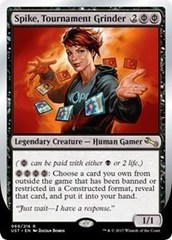
Spike, Tournament Grinder is a very powerful Magic card. On it’s surface, it’s a four mana 1/1, with a four mana activated ability. At face value, that’s really not that strong. Hold on though; there’s more to this one – all thanks to the pretty clear design mistake that is Phyrexian Mana.
Phyrexian Mana, for the uninformed, allows you to pay 2 life as an alternate cost to whichever coloured mana the card asks of you (in this case, black). Now, Spike is a two mana 1/1 that costs four life to cast and four mana to activate. Still, this is not beating any vanilla test we throw at it! The key is that even it’s ability allows payment in Phyrexian Mana. So, all in all, for the low, low cost of two mana and twelve life, you get to tutor for any card that has been banned. Hmm.
Twelve life is a a lot. On turn two, that’s a whopping sixty percent of your life total! Before we go any further, however, let’s take a look at other famous swindlers that have traded life for cards.

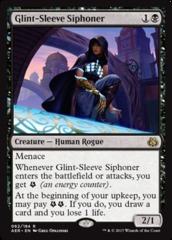
Dark Confidant – Bob, to his friends – is widely considered one of the best creatures to ever see print. He gives you lands for free, and with some clever deckbuilding, his downside can be managed. Glint-Sleeve Siphoner (or Bob after a tall Energy drink), eschews the potential for huge life-loss by trading a single life for each card. If you’ve read my article on life as a resource, you’ll know that life can be manipulated just as can your cards and your mana. A life for a card when you’re at one isn’t much of a deal, but when you’re at twenty? I’ll take ten!
There are plenty of Black cards across the years that have exchanged life for cards. Griselbrand, Necropotence, Yawgmoth’s Bargain, Underworld Connections – the list goes on and on. As you can see, there’s a reason this effect is such a cornerstone of Black’s wedge in the colour pie.
Now, these effects all allow you to drain your own health in exchange for more options, but those options are random. Dark Confidant doesn’t let you search for a Thoughtseize each turn, nor does Underworld Connections let you fetch a Damnation at will. Spike does what these cards can’t – she turns your trade binder into a toolbox. There have been many, many broken cards printed over the years that have destroyed the formats they inhabited. So, what can she get?
Mana
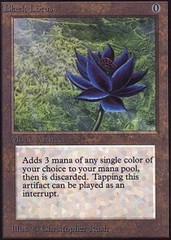
Well, if you’re talking banned cards, you should probably begin with the most iconic card to ever see the light of day. Black Lotus provides an immediate and highly unfair burst in mana, allowing a turn two Spike to become a turn three Consecrated Sphinx with no additional help. For those who are familiar with Vintage, you’ll know that hands without Black Lotus are pretty far away from hands with it!
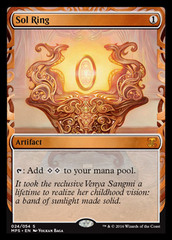
Onto the most powerful thing a Commander deck can be doing on turn one: Sol Ring. While Sol Ring doesn’t provide quite as big a jump in mana as does the Lotus, Sol Ring wins on the consistency angle – it effectively acts as two lands that you can play ignoring the one-land-per-turn rule. Counting the mana spent to cast the Ring, Spike allows for a turn three four drop followed by a turn four six drop. There aren’t many decks that are beating the curve of Spike, Ring, Jace, the Mind Sculptor into Grave Titan!
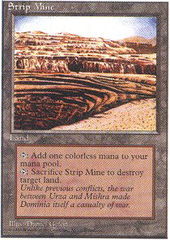
Finally on the mana angle is the best Wasteland you’ve ever seen. Strip Mine does everything Wasteland can do, burying shocklands and Nexi, just as well as it drowns Islands and incinerates Mountains. Even without the combo of Crucible of Worlds or Ramunap Excavator, there is nothing more heartbreaking than keeping a one-lander with a Ponder, missing a land in your top three cards, whiffing on the random draw, then watching in horror as both your Island and hopes to win get stripped away.
Interaction
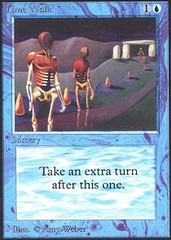
If you’re going to interact with your opponent, you’ll normally affect their cards. You’ll destroy a creature, you’ll discard a card, you’ll counter a spell. You might even steal their creature and claim it as your own. Time Walk laughs at these efforts, as it robs your opponent of their entire turn. Time Walk lets you untap, acting as a mana bump. It lets you see another draw step, replacing itself immediately. It enables another combat step, killing an opponent on out of nowhere, or giving you the chance to activate your Planeswalkers again. What more is there? With four mana and twelve life available, Spike becomes a 1/1 Time Walk. Enough said.
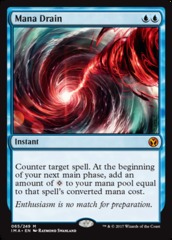
When Mana Drain was first printed, Mana Burn was still a rule in Magic. The design was simple enough – Counterspell was too strong in the draw-go decks, so Mana Drain was created as a replacement that burned out the user equal to the size of the countered spell. If the user wanted to avoid this, they would need to use the mana on their turn, and give the opponent an opening to resolve something. Seems reasonable, right? Wrong. Mana Drain wound up becoming the ultra-super-mega-chocolatey-fudge-coated-super-Counterspell that Counterspell itself could only dream of being.
While a tutored Mana Drain is weaker than the surprise kind, what is your opponent going to do? Never cast spells? If you have UU open and eight life to spare, Spike turns into the best haymaker deterrent you’ve ever seen. If the opponent goes for it? You get to untap and slam a six or greater mana play, from as early as turn four!

I hasten to call big daddy Jace ‘interaction’, as he spends the vast bulk of his time as a Brainstorm on a stick, but let’s not forget – he also bounces creatures and screws with libraries with the best of them. Jace’s only real ‘weakness’ (if you can even call it that) is his hefty mana cost. While four is when things just get started in Standard, in Legacy or Vintage, four is the absolute top of the curve before we start cheating on mana with Show and Tell or Sneak Attack. You don’t want to get stuck with a pair of Jace in hand when you desperately need a Mental Misstep or a Lightning Bolt. Spike solves this nicely, by allowing you to find the end-game to end all end-games at will.
Draw
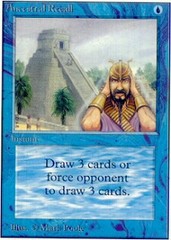
It doesn’t get more efficient than this. In current design terms, this effect costs 3UU, and it takes Jaces’ own Ingenuity to do it. What can I say? If you just need raw card advantage, Spike turns a bunch of life and a single Blue mana into three new cards.
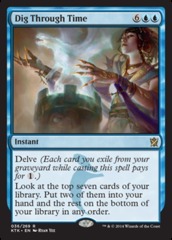
The draw spell for the discerning Magic player, Dig Through Time is the greatest filtering spell and biggest mistake to leave WoTC’s design department in a number of years. Ancestral is certainly more efficient, but Dig provides a look at an extra four cards, and even allows your top two picks of the crop. This one does require a little help to reach that magical two costing, but we’ve already established that life is a resource – with the help of Polluted Delta, Bloodstained Mire and co., you’ll be well on your way to enjoying the finest in card draw and selection a banned list has to offer.
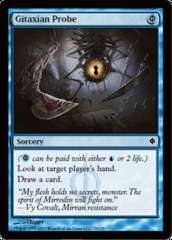
Sometimes, you need to know what your opponent is up to. Maybe you need to see if the path is clear to resolve your Ancestral, or Show and Tell. Maybe you just want to take a Peek.
Sometimes, you’ll have a blue mana available and no life to spare. For every other time, there’s Gitaxian Probe.
Summary
There are plenty of other applications for Spike that I’ve missed off of this list – game-enders like Emrakul, the Aeons Torn, disruption like Mind Twist, or even efficient beaters in Smuggler’s Copter and Reflector Mage. Whatever the need and however dire the circumstances, the dedicated Spike has a couple tricks up her sleeve. I know I certainly do!
This weekend is the launch of Unstable, and I’m sure many high fives will be had and rules misunderstood (thanks, Rules Lawyer). As always, if you’ve got suggestions of tutor targets, questions or ideas, leave them in the comments below. Good luck!





